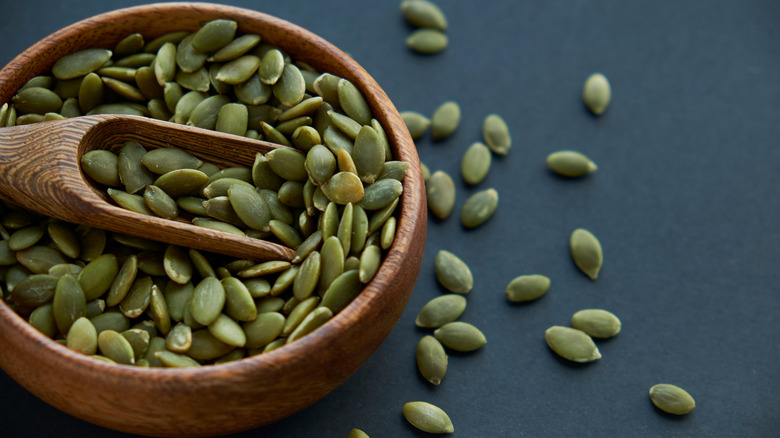This Simple Snack Can Prevent The Afternoon Slump
We've all been there — that sluggish, post-lunch wave of fatigue that creeps in after the initial caffeine buzz of the day has long since abated. Energy drinks or an additional cup of coffee may work as quick fixes, but loading up on caffeine so late in the day can wreak havoc on your sleep come bedtime, according to the American Academy of Sleep Medicine. Thankfully, science offers us a viable alternative to get our engine back up and running — without the accompanying jitters.
Pumpkin seeds fall into the category of "super seeds," a term often used to reference nutrient-rich seeds that are packed with essential vitamins and minerals (via Marshfield Clinic Health System). Joining the ranks of chia seeds, flaxseeds, and numerous others, pumpkin seeds are a great source of fiber, protein, magnesium, manganese, and phosphorus, per Food Technology. Though small in size, pumpkin seeds pack a punch when it comes to health benefits. Among them, pumpkin seeds have been shown to decrease inflammation, lower one's risk for diabetes, boost heart health, and hinder the growth of cancer cells (via WebMD). But can pumpkin seeds boost our energy levels, too?
Consider reaching for pumpkin seeds over coffee
"If you have a lull in the afternoon, pumpkin seeds can help," says clinical neuroscientist psychiatrist, Dr. Daniel Amen (via mindbodygreen). Pumpkin seeds contain various nutrients that can help maintain our body's energy in different ways. For example, the magnesium within pumpkin seeds helps keep our blood sugar levels balanced. When you sub in a handful of pumpkin seeds in place of a coffee, you're avoiding the inevitable blood sugar crash later that afternoon.
Additionally, when eating pumpkin seeds, you're giving your body a healthy dose of iron. According to mindbodygreen, just 1 ounce of pumpkin seeds takes care of 11% of the recommended daily intake of the mineral. Without adequate amounts of iron, your red blood cells aren't getting enough oxygen needed to function, leading to feelings of fatigue (via Mayo Clinic). In fact, 30% of U.S. women and children are considered iron deficient (via Columbia University). By maintaining a healthy intake of iron, you can help keep exhaustion at bay.


